Choosing the right countertop is a pivotal part of kitchen design. With the array of kitchen countertop materials available, finding the perfect one can be a daunting task. This article provides a comprehensive kitchen countertop materials comparison to help homeowners make an informed decision.
From quartz and granite to bamboo and recycled glass, we have delved into the pros and cons of 12 different types of countertops. Our countertop materials comparison chart will serve as a helpful guide (Learn: The Ultimate Guide to Waterfall Countertop) in your quest for the ideal countertop material.
Quartz Countertops: A Durable and Low-Maintenance Option
Quartz countertops are one of the best options for homeowners seeking a blend of visual appeal and durability. Made from natural quartz and resin, these countertops are renowned for their durability and stain-resistant properties. Unlike natural stone options, quartz countertops do not require sealing, making them low maintenance.
Quartz offers a wide range of colors and patterns to match any kitchen design. The non-porous surface ensures it remains resistant to stains from coffee, oil, and other common kitchen substances. However, quartz countertops are not as heat resistant as some other materials. It’s best to use hot pads or trivets under hot pans to avoid potential damage.
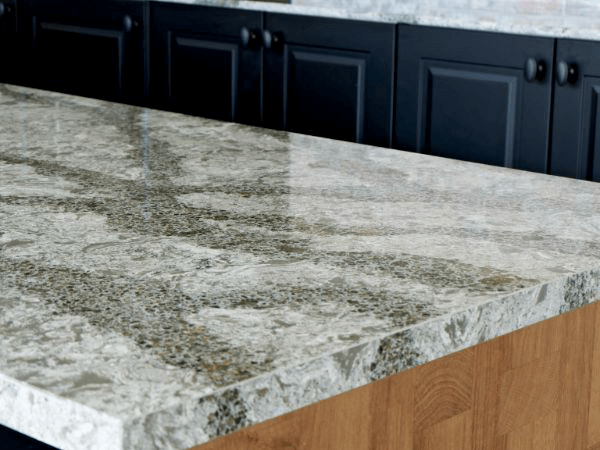
Granite Countertops: The Classic and Unique Choice
Granite countertops (Learn: Get Creative With Granite Alternatives for Countertops) are a favorite choice among homeowners for their unique and natural aesthetic. Each granite slab boasts a unique pattern, ensuring no two granite countertops are exactly the same. This high-quality natural stone offers a range of colors and designs.
Granite countertops are durable and heat-resistant, making them ideal for kitchens where hot pans are common. However, they need regular sealing to prevent staining and to maintain their pristine appearance. Granite countertops also bring a significant boost in resale value, making them an investment-worthy choice.
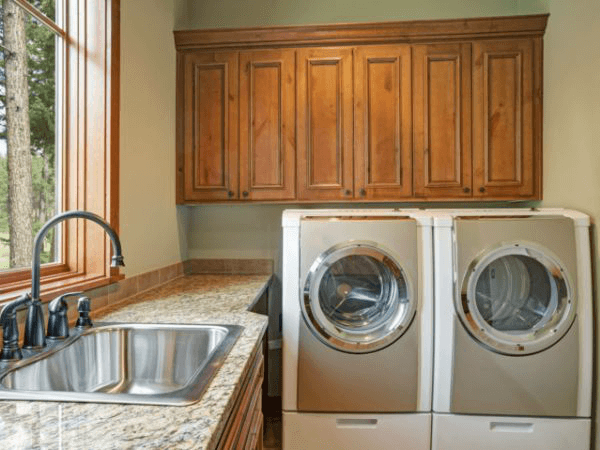
Marble Countertops: Timeless Elegance with Maintenance Requirements
For centuries, marble has been synonymous with luxury and timeless elegance. Marble countertops add a level of sophistication to any kitchen design. With unique veins and a wide range of colors, each slab is a piece of art in itself.
Marble is naturally heat-resistant and can handle hot appliances without causing damage. However, it’s more porous than quartz and granite, which means it’s more prone to staining. Regular sealing is crucial for marble countertops to protect them from potential staining. Despite its maintenance requirements, marble remains a popular choice for its unparalleled beauty.
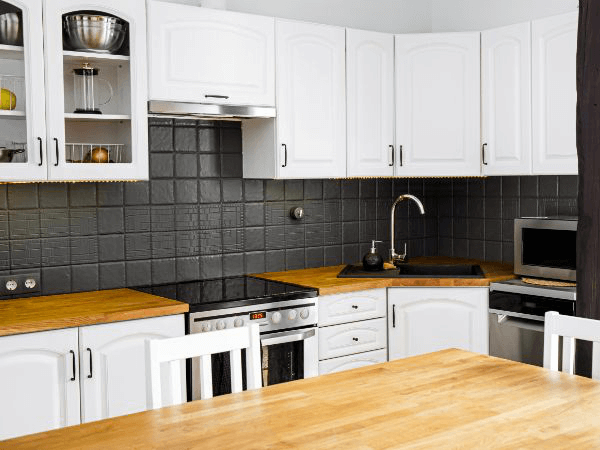
Solid Surface Countertops: Sleek and Contemporary with Easy Maintenance
Solid surface countertops, like Corian, offer a sleek and contemporary look for modern kitchens. These countertops are made from a blend of natural minerals and acrylic or polyester resin, providing a non-porous and stain-resistant surface. Solid surface countertops are easy to clean, and minor scratches or blemishes can be buffed out with a gentle abrasive.
One of the key benefits of a solid countertop surface is the less-seam look, as joints are almost invisible. It is also available in a myriad of colors and patterns. However, solid surface countertops are not as heat resistant as natural stone countertops. Direct contact with hot pots or pans can cause damage, so trivets or heat pads are recommended.
Butcher Block Countertops: Warmth and Charm with Porosity Concerns
Butcher block countertops lend a warm, rustic charm to kitchens. These countertops, made from pieces of hardwood like walnut or maple, create a cozy, inviting atmosphere that’s difficult to achieve with other countertop materials. The natural patina that develops over time adds to its charm.
However, butcher block countertops require regular maintenance. They are susceptible to scratches and stains, so frequent sealing is necessary to maintain their beauty. While they can withstand some level of heat, it’s recommended to use trivets with hot pots and pans to prevent scorching. Despite these concerns, homeowners appreciate butcher block countertops for their DIY-friendly nature and the welcoming touch they add to the kitchen.
Laminate Countertops: Budget-Friendly and Versatile
For budget-conscious homeowners, laminate countertops can be a great choice. They are cost-effective and offer a wide range of colors and patterns, mimicking the look of more expensive materials like granite or marble. Formica is a popular type of laminate that offers a cost comparison countertop materials can’t beat.
Although laminate countertops are stain-resistant and easy to clean, they are less durable than other materials. They can be damaged by heat, and scratches are difficult to repair. However, for a kitchen countertop materials (Learn: How to Choose from 10 of the Best Materials for Kitchen Sink) comparison price chart, laminate sits comfortably at the more affordable end, making it a popular choice among homeowners on a budget.

Soapstone Countertops: Durability with a Natural and Unique Look
Soapstone countertops are known for their durability and unique natural beauty. The material is dense and non-porous, making it resistant to stains and heat. Soapstone is often a dark gray color that can darken over time, adding to its appeal.
However, soapstone is softer than other natural stones, meaning it can scratch or chip more easily. Regular application of mineral oil can help darken the stone evenly and reduce the appearance of scratches. Despite these minor concerns, soapstone’s longevity and distinct look make it a worthy contender in any countertop materials comparison chart.
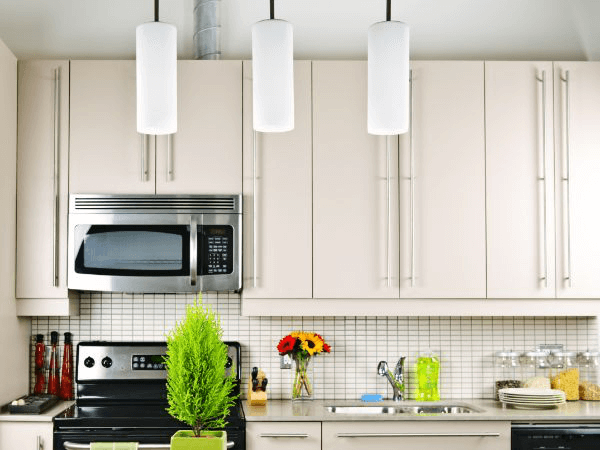
Ceramic Tile Countertops: Affordable and Customizable, but Prone to Grout Issues
Ceramic tile countertops offer a customizable and affordable alternative for homeowners. Available in various shapes, sizes, and colors, these countertops can match any kitchen design. They are heat-resistant, making them ideal for placing hot pots and pans.
However, ceramic tile countertops have grout lines, which can stain and require regular cleaning to maintain their appearance. Additionally, the tiles can chip or crack if struck with heavy objects. Despite these issues, the affordability and versatility of ceramic tiles remain appealing for many homeowners, making it an essential part of the countertop materials comparison.
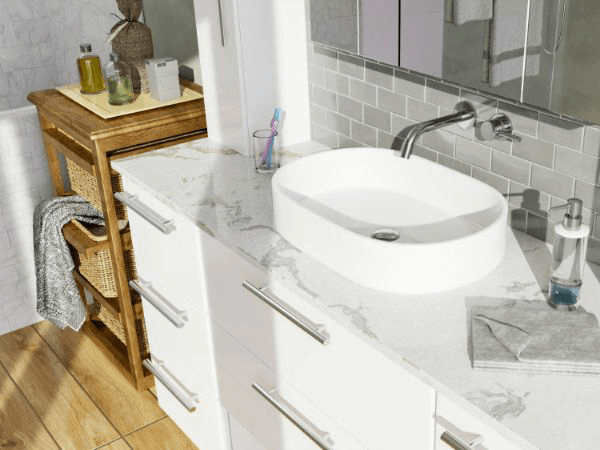
Stainless Steel Countertops: Modern and Hygienic, but Susceptible to Scratches
Stainless steel countertops bring a modern, professional aesthetic to the kitchen. Renowned for their use in restaurant kitchens, stainless steel counters are highly durable, heat-resistant, and hygienic, as they do not harbor bacteria.
However, they can show scratches and fingerprints more easily than other materials, which might necessitate regular cleaning. Additionally, stainless steel can dent if hit with a heavy object. Despite these drawbacks, stainless steel countertops remain a popular choice for their sleek look and sanitation benefits, proving their worth in the countertop materials comparison.
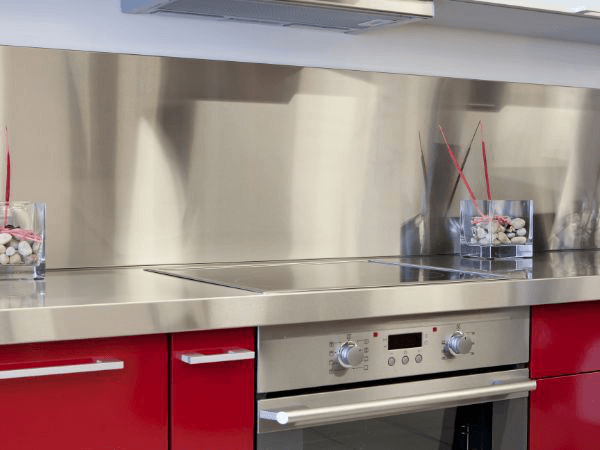
Concrete Countertops: Industrial Aesthetics with Vulnerability to Cracks
Concrete countertops offer homeowners an industrial aesthetic that’s customizable in terms of color and finish. They’re durable, and their heat-resistant properties make them suitable for kitchens.
However, like other porous materials, concrete countertops require sealing to prevent staining and water absorption. They can also develop cracks over time, but these are often viewed at Stainless Steel Countertops as adding to the countertop’s character. Despite the need for periodic resealing, concrete countertops’ unique look and feel add another worthy option to the countertop materials (Learn: Bar Tops Materials: Explore Your Right Option) comparison chart.
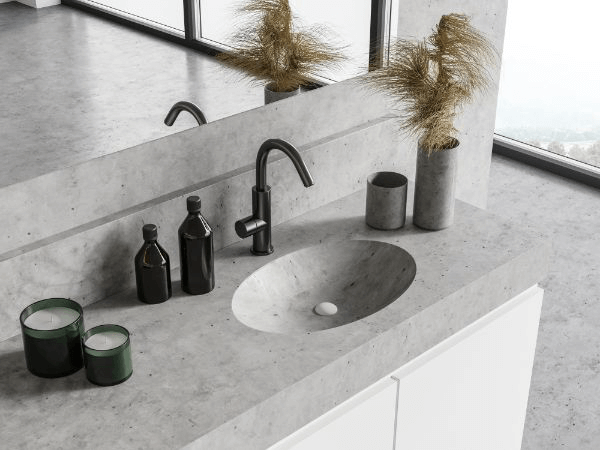
Bamboo Countertops: Eco-Friendly Option with Staining and Moisture Concerns
Bamboo countertops are an eco-friendly alternative that offers a warm and contemporary feel. As a rapidly renewable resource, bamboo is a great choice for the environmentally conscious homeowner.
However, bamboo countertops require regular sealing to prevent damage from moisture and stains. They can also be scratched or dented, so using cutting boards and being cautious with heavy pots is advised. Despite these considerations, bamboo’s sustainability and aesthetic appeal make it a notable option in any kitchen countertop materials comparison.
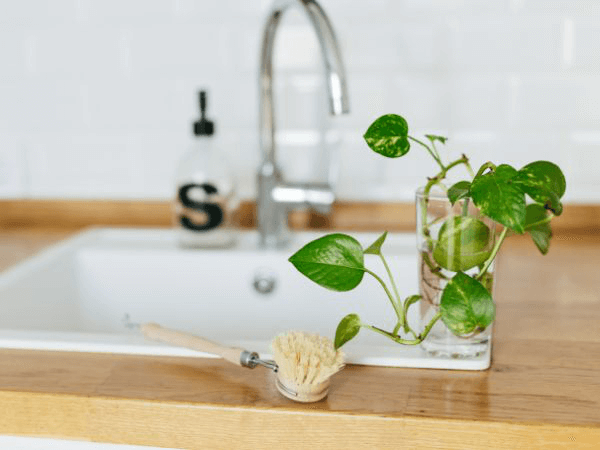
Recycled Glass Countertops: Bold and Eco-Friendly, but Prone to Chips and Stains
Recycled glass countertops are another eco-friendly countertop option, offering a bold and contemporary look. These countertops are made by embedding pieces of recycled glass in a resin or concrete base, resulting in a highly customizable and unique countertop.
While these countertops are fairly durable and heat-resistant, they can chip or crack, especially along the edges. They also require regular sealing to prevent staining. Despite these drawbacks, recycled glass countertops offer a vibrant, unique look and an environmentally friendly countertop option for your kitchen.
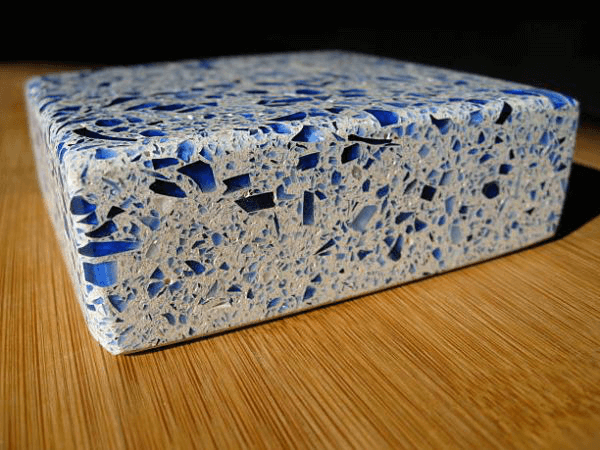
Pros and Cons Summary: Choosing the Right Countertop Material for Your Needs
There is a broad array of kitchen countertop materials to choose (Learn: Kitchen Sink Sizes in Inches-How to Choose the Right Sizes) from, each with its unique characteristics, advantages, and drawbacks. In this countertop materials comparison, we’ve provided a detailed examination of 12 different types of countertop materials to help you understand their strengths and weaknesses.
Whether you prioritize durability, maintenance, cost, or aesthetics, there’s a type of countertop material that can meet your needs (Learn: How Much Countertop Overhang Do You Need). This countertop materials comparison chart is designed to assist you in making an informed decision for your kitchen renovation, helping you create a space that’s both functional and reflective of your personal style.





